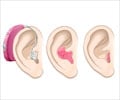A new technique to test and identify 'dead regions' in the brain that could be responsible for hearing loss in children is being developed by Karolina Kluk, a Cambridge University student.
A new technique to test and identify 'dead regions' in the brain that could be responsible for hearing loss in children is being developed by Karolina Kluk, a Cambridge University student. The finding could eventually pave way for development of individualized hearing aids for children.
The currently available methods are based on questioning patients regarding their sensitivity to a range of tones or bleeps. This however, cannot be used with babies. The new electrophysiological test is based on eliciting responses from brain to different frequencies played against a baseline noise while the individual is asleep. The accuracy of this test would be first tested on adults before it can be used in babies.Hair cells present in the cochlea (a part of the ear) has the remarkable ability to respond to sound waves, through a vibratory movement. This in turn is responsible for transmission of nerve impulses to specific region of the brain involved in the hearing process (auditory region).
Children with hearing loss have dead regions that represent the cochlear region which is non-functional or where the cells have died off. The hearing aids that are being developed rely to a large extent on the amplification of the overall sound that is being transmitted to the inner ear. A lot of the sound directed to the dead regions, however go wasted.
The present research highlights the possibility of locating specific dead regions, followed by fine tuning of the hearing aid. This would mean that only the sound directed to the healthy region of the cochlea would be amplified, resulting in better auditory response and effective hearing aids.
'It's important to diagnose dead regions in children as early as possible to be able to fit hearing devices properly or to determine which children require cochlear implants. In the tests we have carried out on two adult patients, the electrophysiological test does seem to be very reliable,' said Dr. Kluk, hopeful about her effort.







